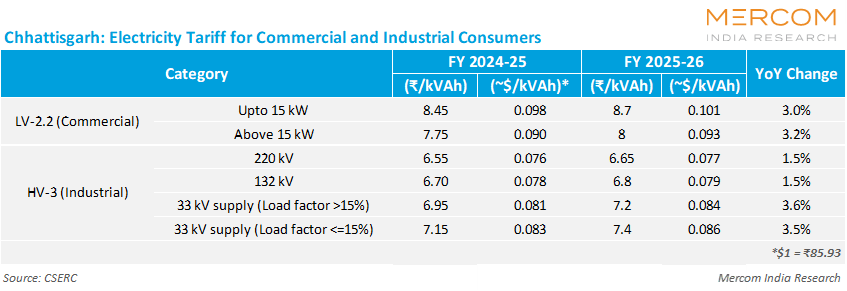Chhattisgarh Hikes FY 2026 Electricity Tariffs by 1.89% Across Categories
The hike aims to address the cumulative revenue gap faced by the power utilities
July 16, 2025
Follow Mercom India on WhatsApp for exclusive updates on clean energy news and insights
The Chhattisgarh State Electricity Regulatory Commission (CSERC) has issued its final tariff order for the financial year (FY) 2026, introducing an average hike of 1.89% across consumer categories. The revised rates are effective until March 31, 2026, or until the next order is issued.
The decision was primarily driven by the need to address a cumulative revenue gap faced by the state’s power utilities, particularly the Chhattisgarh State Power Distribution Company (CSPDCL).
The Commission approved a cumulative revenue gap of ₹5.23 billion (~$63.05 million), resulting in an average tariff increase of ₹0.14 (~$0.0017)/kWh, or approximately 1.89%, without any change in fixed or demand charges. The revised average cost of supply stands at ₹7.02 (~$0.085)/kWh.
Consumer Tariffs
For low-voltage (LV) domestic consumers (LV-1), energy charges range from ₹4.1 (~$0.049)/kWh to ₹8.3 (~$0.10)/kWh across consumption slabs, with fixed charges ranging from ₹20 (~$0.24) to ₹4 (~$0.48)/kW per month.
Non-domestic LV-2 consumers will be charged between ₹6.3 (~$0.076)/kWh and ₹8.7 (~$0.105)/kWh, based on load and phase.
For electric vehicle (EV) charging stations, a new category, LV-2.3, has been introduced with a flat tariff of ₹7.02 (~$0.085)/kWh and no fixed charges. LV agriculture users (LV-3) will be charged ₹5.8 (~$0.070)/kWh and ₹100 (~$1.20)/HP/month, with a 30% rebate for non-subsidized consumers.
Industrial tariffs (LV-5) range from ₹4.55 (~$0.055) to ₹6.80 (~$0.082)/kWh, depending on the load and region.
Public utilities (LV-6) will be charged ₹7.35 (~$0.089)/kWh, with fixed charges ranging from ₹142 (~$1.71) to ₹190 (~$2.29)/kW.
Time-of-Day Tariffs
The Time-of-Day tariffs will take effect on September 1, 2025, with a 5% premium during peak hours (5 PM to 11 PM) and a 5% discount during off-peak hours (9 AM to 5 PM).
High Voltage Consumer Tariff
For high-voltage (HV) categories, railway (HV-1) consumers will be charged ₹5.55 (~$0.067)/kVAh with a demand charge of ₹375 (~$4.52)/kVA/month. Mining (HV-2) consumers must pay energy charges ranging from ₹6.95 (~$0.084) to ₹7.80 (~$0.094)/kVAh, depending on the voltage level.
Tariffs for general industries (HV-3) vary from ₹6.65 (~$0.08) to ₹7.90 (~$0.095)/kVAh, while steel (HV-4) tariffs range between ₹6.1 (~$0.073) and ₹7.55 (~$0.091)/kVAh, including load factor rebates up to 25%.
Agriculture/public water works (HV-5) will be charged ₹6.6 (~$0.08)/kVAh, and residential bulk (HV-6) at ₹6.80 (~$0.082)/kVAh.
Startup power under HV-7 will be charged at ₹9.10 (~$0.11)/kVAh with a demand charge of ₹200 (~$2.41)/kVA/month.
A new category, HV-11, has been introduced for EV charging with a single-part tariff of ₹6.32 (~$0.076)/kVAh.
Wheeling and Open Access Charges
CSERC has introduced wheeling charges of ₹0.29 (~$0.0036)/kWh for consumers on the 33 kV level and ₹0.85 (~$0.010)/kWh for those below the 33 kV level.
Distribution losses are set at 6% for 33/11 kV voltage levels and 10% for levels below 33 kV. Short-term open access users must pay ₹2,000 (~$24.10)/day to CSLDC.
The Commission set a cross-subsidy surcharge of ₹1.33 (~$0.016)/kWh for 220 kV, ₹0.94 (~$0.011)/kWh for 132 kV, ₹1.40 (~$0.017)/kWh for 33 kV and 11 kV, and ₹1.27 (~$0.015)/kWh for LT consumers.
Standby charges for open access users are ₹10.53 (~$0.12)/kWh up to the contract demand and ₹14.04 (~$0.16)/kWh beyond this level. Parallel operation charges for captive generators have increased to ₹0.15 (~$0.0018)/kWh from ₹0.13 (~$0.0016).
Revenue Approvals
Alongside consumer tariff changes, the Commission has finalized the aggregate revenue requirements (ARR) for all the state’s power utilities — Chhattisgarh State Power Generation Company (CSPGCL), Chhattisgarh State Power Transmission Company (CSPTCL), Chhattisgarh State Load Despatch Centre (CSLDC), and CSPDCL.
CSPDCL’s standalone ARR has been approved at ₹224.9 billion (~$2.71 billion), while the net ARR, including the revenue deficit, amounts to ₹256.3 billion (~$3.09 billion).
For transmission utility CSPTCL, the approved ARR is ₹13.46 billion (~$162.30 million), with monthly transmission charges of ₹1.49 billion (~$18.02 million). The short-term open access transmission charge has been fixed at ₹0.3445 (~$0.0041)/kWh, and transmission losses are pegged at 3%.
CSLDC’s net ARR is ₹242.3 million (~$2.92 million), after adjusting for a surplus of ₹9.8 million (~$118,000). System operation charges are ₹193.9 million (~$2.34 million), and intra-state market operation charges stand at ₹48.5 million (~$584,000).
Other Financial Adjustments
Consumers must pay ₹0.5 (~$0.006)/kWh for carbon reduction certification. Additional charges for availing green power range from ₹0.24 (~$0.0029)/kWh for wind to ₹4.43 (~$0.053)/kWh for hydro.
The fuel and power purchase adjustment surcharge will continue to be billed on a bi-monthly basis, starting with the new base rates for July 2025 consumption. Tax and duty charges are excluded from the tariff and remain payable in accordance with the state laws.
In April this year, CSERC approved a tariff of ₹3.50 (~$0.0409)/kWh for procuring 310 MW of solar power under the Pradhan Mantri Kisan Urja Suraksha Evam Utthaan Mahabhiyan (PM KUSUM) Component C.
Subscribe to Mercom’s real-time Regulatory Updates to ensure you don’t miss any critical updates from the renewable industry.

